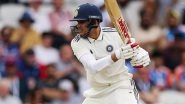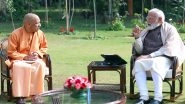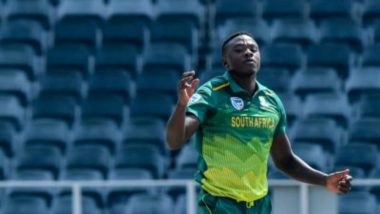Cape Town, November 23: South Africa pacer Kagiso Rabada on Monday said that it was a team decision to not take the knee in their upcoming white-ball series against England. Last week, Proteas coach Mark Boucher had revealed that the team would not be kneeling to show support towards the Black Lives Matter movement rather they would be extending support to the issues that the country's president Cyril Ramaphosa has raised.
"Black Lives Matter is one-hundred percent something I will always stand for and I speak for myself. It was a team decision not to kneel and to look at gender-based violence and devote ourselves to another cause," ESPNCricinfo quoted Rabada as saying. Also Read | Mohammed Siraj Opens Up on Decision to Stay Back in Australia After Father's Demise, Says 'Want to Fulfil His Dream and Play for National Team'.
"However, Black Lives Matter will always be relevant and something I will always believe in and I speak for myself there. But, Mark has stated that the team will not be kneeling and that's how it's going to be," he added.
However, Boucher also said that the Proteas players will consider wearing a black armband to show solidarity with the fight against gender-based violence and in memory of the victims of COVID-19, in line with a call made by Ramaphosa to declare November 25-29 national days of mourning.
During the 3TC game in July, players and all support staff including the director of cricket Graeme Smith wore black arm-bands and took a knee before the match to extend support to the Black Lives Matter (BLM) movement. Earlier this year, 31 former and current Proteas cricketers had signed a letter showcasing their support towards the Black Lives Matter campaign and pacer Lungi Ngidi.
Following this, Cricket South Africa (CSA), its board of directors and executive committee had reaffirmed their support towards the BLM movement, and its relevance in South Africa. India vs Australia 2020: Ahead of the ODI Series, Let’s Look at India’s Five Leading Run Scorers in ODIs Down Under.
"We note the claims of discrimination and racism that have been made by current and former players and coaches, and we acknowledge that these are a part of the sport's past, and sadly, its present. We have to face the reality, as management and custodians of the game, that we need to come up with creative, tangible, and meaningful ways to address this -- even more, than we have done already -- to make sure that they are not part of our future," the CSA had said in an official statement in July.
South Africa and England are slated to lock horns against each other in three T20Is and three ODIs, starting November 27 in Cape Town.
(The above story is verified and authored by ANI staff, ANI is South Asia's leading multimedia news agency with over 100 bureaus in India, South Asia and across the globe. ANI brings the latest news on Politics and Current Affairs in India & around the World, Sports, Health, Fitness, Entertainment, & News. The views appearing in the above post do not reflect the opinions of LatestLY)













 Quickly
Quickly


